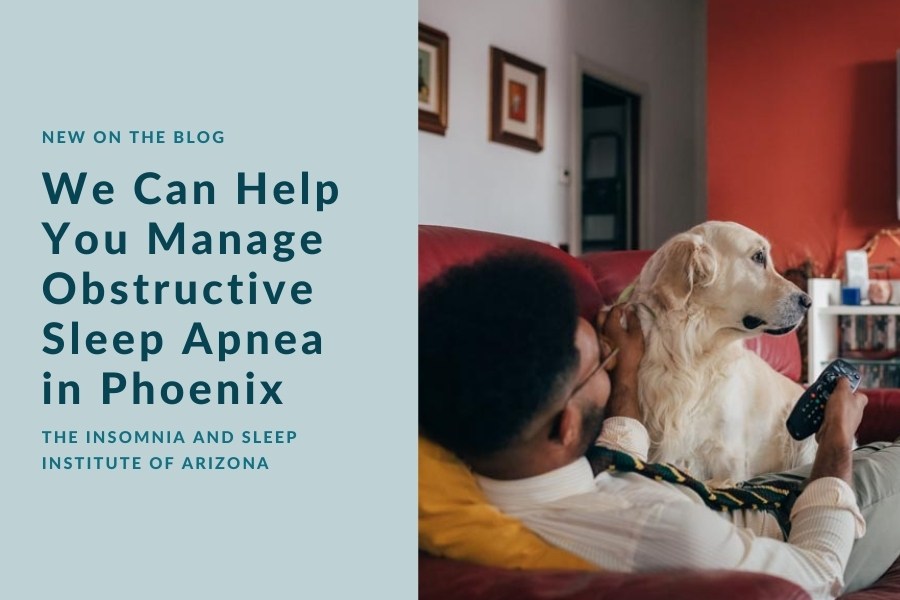Obstructive sleep apnea, or OSA, is the most common form of sleep apnea. At The Insomnia and Sleep Institute of Arizona, we are proud to be the Face of Sleep Medicine in the Phoenix area. Driven by outcomes, we know your journey should begin with the right diagnosis well before testing and treatment takes place. We are staffed by sleep specialists and have been awarded “Top Doc” in the region for the last six years, and are here to help you get control of your obstructive sleep apnea in Phoenix.
A recent article in JAMA estimates that 17 percent of women and 34 percent of men in the country suffer with obstructive sleep apnea. The researchers compiled a review of recent literature and findings, and found that the most common symptom of OSA is excessive daytime sleepiness—however, this is only reported by 15 – 50 percent of people with obstructive sleep apnea.
What to Do About OSA
Researchers also considered the trending popularity of at-home testing, but found that this was only about 80 percent reliable. OSA in Phoenix can be caused by a number of factors, including obesity or carrying excess weight (despite not being obese). It is critical to get obstructive sleep apnea under control because it causes a 2 or 3-fold increase in the risk of metabolic and cardiovascular disease. Those who are overweight and struggle with OSA may benefit from weight loss, but this isn’t always possible and it certainly isn’t immediate.
The best method for managing obstructive sleep apnea remains applying positive airway pressure with a CPAP machine, according to the report. Surgical modifications such as changing the facial skeleton to open up the airway can also be effective, but this route is highly invasive and not recommended until many other less aggressive therapies have been exhausted. For example, if CPAP therapy fails, there is a minimally invasive surgery that places an implant in the chest area to help with sleep apnea.
What OSA Researchers Found
The researchers stress that CPAP therapy is the first and best means of managing obstructive sleep apnea, a “common condition” that is just going to continue to increase in prevalence due to the increase in obesity. Researchers also note that most people with OSA are asymptomatic and do not self-report any signs of OSA during the day. Medications were not found to be effective in managing OSA, nor is exercise (save for the benefit of potential fat loss in those who are overweight).
There is another factor to consider in recent months with OSA, and that is how OSA might impact COVID-19 severity. Another article in the Journal of Clinical Sleep Medicine (2020) found that obstructive sleep apnea is “strongly associated” with many co-morbidities that are also linked to “severe” COVID-19 symptoms. These co-morbidities include obesity, hypertension, cardiovascular disease, and diabetes. There have been two small studies that observed patients with severe pneumonia associated with COVID-19, and researchers found that obesity plays a major role in these cases. OSA, as well as obesity hypoventilation, can lead to hypoxemia, which in turn can worsen the hypoxemia in COVID-19 related pneumonia.
What These Findings Tell Us
Not every person with obstructive sleep apnea is obese, but many times this is the case. Reducing excess fat can dramatically improve OSA symptoms—as well as COVID-19 symptoms. It is not surprising that reducing excess weight is important for anyone’s overall health, and most patients find relief in other complaints when they achieve a healthier weight. However, weight loss is also not always simple, fast, or even achievable for patients. There are many factors that can contribute to obesity and being overweight.
Ultimately, when it comes to managing OSA in Phoenix, you deserve immediate results. OSA might be common, but it can also be very dangerous. A lack of sleep or quality sleep can negatively impact your social and professional life. Excess fatigue can keep you from performing your best at work, driving a car safely, and engaging in hobbies and with those you love. That’s why we are dedicated to a diagnosis-first approach with unprecedented staffing levels. Connect with The Insomnia and Sleep Institute today to start your journey toward OSA management. Complete the online form or call the office to schedule your consultation with a sleep expert.





